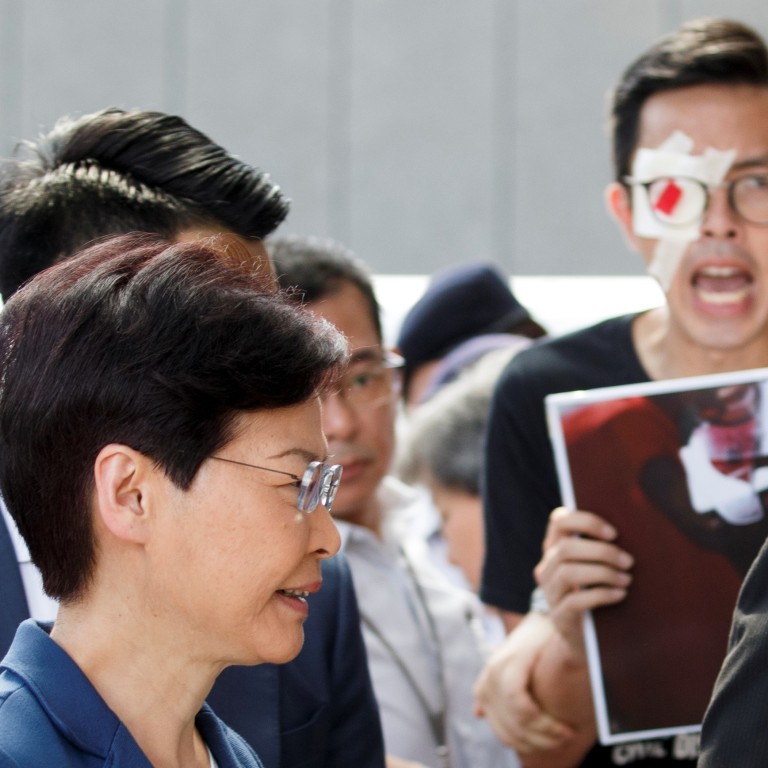
Carrie Lam has to reconnect with the people if she is ever to understand the root of Hong Kong’s crisis
- Since the handover, the government has systematically dismantled grass-roots listening channels. So it is hardly surprising Lam stumbled blindly into the extradition crisis
- She needs to realise the problem is rooted in the plan itself, not the way it was communicated
Once upon a time, I used to spend a large part of every working day helping companies on crisis preparedness and crisis management, in particular helping them communicate as crises raged.
I would like to claim that most recognised that it paid to be prepared: to have plans that would swing into action in a crisis. Such plans would identify who had to focus on what in those sweaty, frantic moments after a crisis erupted. They would identify “tripwires” that provided early warning signals to ensure the response was as speedy as possible: it is a platitude that every minute lost explodes the prospective harm.
Such plans would make clear who talks to stakeholders, including the media, and would make sure those chosen executives had been pushed through the mill of crisis simulation exercises.
I say I would like to claim companies were prepared, but in truth they rarely were. Committing funds to building crisis preparedness almost always came under “Any Other Business” at the bottom of an already-overcommitted agenda, always deferred to the next board meeting.
Even among companies that committed to developing a “crisis plan”, it was almost always a “manual” that sat undisturbed on executive shelves. In a crisis, those executives always seemed to think they could resolve it by simply reaching for the plan and “turning to page 46”.
Such is the “control freak” mentality of many senior managers that they seem incapable of realising that each and every crisis is unique and that “plans”, to be useful, need to be living documents that shape attitudes and routine practices rather than engine repair manuals.
Because so many clients failed to develop plans that anticipated and gave early warning of a looming crisis, the reality was that I spent most of my time back then wrestling with crises that had already exploded. The temptation, always resisted, was to tell executives “I told you so” over those crisis preparedness plans that were never budgeted for.
But the difficult and gloomy first message was always that, no matter how well the company rebuilds and communicates in the wake of the crisis, real and perhaps substantial harm had been done.
Until Lam and her team acknowledge that the crisis they face is rooted in the plan they developed, not in the way they communicated it, there is no prospect of resolution.
Young or old, Hongkongers want better government
And as they eventually get to grips with why they were so fatally mistaken in pressing so aggressively forward with the extradition bill, they will, paradoxically, need to look hard at their internal communications.
At the heart of these were district officers and district councils, regular surveys undertaken by the Central Policy Unit (CPU), and a total of 490 advisory committees seeking public and expert opinion on all manner of policy issues.
Cheung notes how advisory committees have, in the past 20 postcolonial years, degenerated into validation channels rather than information and feedback channels. He tracks how the district officer channels have atrophied with the government deliberately avoiding canvassing district councils “to avoid giving media exposure to dissenting voices”.
As the CPU was dismantled, its designated team to monitor and analyse online public opinion in blogs and the like was disbanded and the task transferred to Chu’s Information Services Department – without giving it any funding to do the job. So, too, were the CPU’s regular surveys abandoned when its successor, the Policy Innovation and Coordination Office, was set up two years ago.
The government could hardly have been more systematic in dismantling all plausible grass-roots listening channels. No surprise, then, that Lam stumbled blindfolded into the extradition bill crisis. Nor that she is still perplexed over the causes of public opposition and discontent.
Hong Kong has to end this leaderless drift and save itself
If the British colonials could do it, there is no reason Lam could not do it measurably better.
Her administration must not only be seen to be listening, but to be taking respectful account of the views and concerns of significant majorities. Instead of arrogantly blaming their messengers, they must look to their own messages, which have drifted so far from the concerns of the community her administration represents.
David Dodwell researches and writes about global, regional and Hong Kong challenges from a Hong Kong point of view

